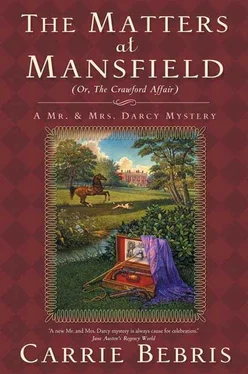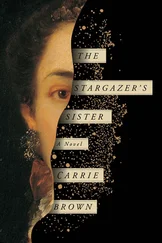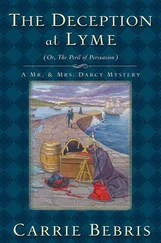“I am afraid we must discuss it further, my lord, before it can be finalized.”
“Further? Very well. But what has this gentleman to do with my bride?”
“Nothing, my lord. Nothing that need trouble you. He is only — only a Mr. Garrick.”
He blinked and scratched his head. “But I thought I heard you call him Henry Crawford.”
“You did. I should not have addressed him so.”
“Well, is he Mr. Crawford or Mr. Garrick?”
“The matter is complicated.”
The viscount rubbed his chin, which appeared in need of shaving. “If he is Mr. Crawford, is he Miss de Bourgh’s Mr. Crawford?”
“Anne no longer has a Mr. Crawford.”
The elderly gentleman appeared so confused that he looked as if he could not at once absorb Lady Catherine’s words and remain standing. He leaned heavily on his cane. “This is all most perplexing…”
“Indeed, it is, my lord. Allow me to escort you back to your chamber whilst I explain everything you need to know.” With a final glare at Mr. Crawford, Lady Catherine led the viscount from the room.
Elizabeth wondered just how Lady Catherine planned to “explain” the present situation in a way that would enable her plan to proceed. As sorry as Elizabeth felt for Anne, she experienced equal sympathy for Lord Sennex. It vexed her to witness Lady Catherine taking advantage of his age and mental frailty to advance her own selfish interests.
She excused herself from the parlor temporarily. To her knowledge, no one had yet informed Anne or Colonel Fitzwilliam of Mr. Crawford’s return from the dead, an omission she undertook to rectify. She was stopped on her way to the staircase by Mrs. Norris, who apparently had come to the inn solely for the purpose of being among the first in the village to obtain particulars about Mr. Crawford’s miraculous resurrection.
“Mrs. Darcy, is it true? Is Henry Crawford indeed alive?”
Elizabeth lacked the patience to deal with the busybody at present. The day would soon turn to evening, yet there seemed to be no end of it in sight.
“Yes, he is. Would you care to join the queue of persons who have business with him?”
Her eyes widened. “No — no, indeed! I merely wanted to know — for Maria’s sake. I have no wish to see that scoundrel.”
Now that Henry Crawford was alive once more, he was again a scoundrel. So much for Christian forgiveness.
“But if Mr. Crawford is alive,” Mrs. Norris pressed, “who was found in Mansfield Wood?”
“A traveler.”
“Does anyone know who killed him?”
“That is perhaps a question best directed to Sir Thomas. Now, if you will excuse me…”
Elizabeth left Mrs. Norris and headed upstairs, restraining herself from physically throwing back her shoulders to shake off the encounter. She found the old gossip more disagreeable with every conversation.
On the landing, she met Colonel Fitzwilliam and quickly apprised him of the day’s extraordinary events. His jaw settled into the same rigid set as Darcy’s did when aggravated, and she was struck by the resemblance between the cousins. They both carried within them a strong sense of honor, and a subsequent disdain for those who so profoundly lacked one of their own. Both were highly conscious of duty; just as Darcy upheld his responsibility to his tenants and others who depended upon him for their livelihood, so, too, did Colonel Fitzwilliam take seriously his responsibility to the men under his command. They also shared a commitment to family, particularly the protection of those in their charge. He was a good man, Colonel Fitzwilliam, and could make a fine husband to Anne if only Lady Catherine and Henry Crawford would leave them be.
He muttered something under his breath. Elizabeth could not quite make it out, but from the hard expression of his eyes she suspected it was not the most gentlemanly of sentiments.
“I was on my way to acquaint Anne with this turn of events,” she said. “Though perhaps you would do me the favor of delivering the news? You have been a steadfast companion to her these many days; she might hear it better from you.”
“I would that there was no such news to impart,” he said. “But yes, I shall tell her directly.”
As she left him, she wondered whether Henry’s return would prove a blessing in the end. Perhaps Lady Catherine’s grand designs would at last crumble, and she would be forced to give them up and accept Anne’s wishes.
She reached the main floor in time to see Viscount Sennex coming in the front door with Mrs. Norris, of all people. Whatever had the two of them to do with each other?
“I thought you were conversing with Lady Catherine, my lord?”
“Indeed, yes. Then I stepped outside for a moment and became a bit turned around. This kind lady took pity on me and led me back.”
“He was returning from the necessary,” Mrs. Norris offered in a too-loud whisper. “You might want to keep a watch on him, lest he wander off and be unable to find his way back.” She tapped her head meaningfully. Fortunately, the viscount did not seem to notice her less-than-subtle reference to his mental state. He was busy shuffling back out the door.
“I shall bear that in mind, thank you.” She hastily excused herself from Mrs. Norris and caught up with the viscount just outside.
“My lord, I believe your room is this way — within the building?”
“What? Oh! Yes — yes, of course. I was merely on an errand”—he glanced in the direction of the necessary—“of a personal nature.”
Had he not just attended to such an errand? Pity entered her heart as she regarded the elderly man. He did not appear that feeble, but looks could be deceiving, as evidenced by his frequent trips to the privy. It was, she supposed, one of the indignities of old age. Poor Viscount Sennex.
Poor Anne!
“Do not you worry about me, young lady. I shall return to my chamber in a few minutes.”
Elizabeth forced a cheerful smile to her lips. “Of course.”
She felt, as she watched him walk off, that she ought to wait to ensure that he actually made it back to his room safely. He looked so frail — his posture stooped, his clothes hanging loosely on a frame that no longer filled them. But she did not want to subject the viscount to the embarrassment of being treated like a toddler whose nurse stood outside the privy door. Why was his valet not more attentive? Surely he had brought a personal servant, had he not? Come to think on it, she had not seen one with him — perhaps he and Neville had brought only one to attend them both, and Neville commanded more of his service.
She spotted Nat, the innkeeper’s son, and pressed a penny into his hand. Nodding toward the viscount, she asked Nat to discreetly help him back to his room if need be. “And here is a sixpence to remain watchful of the viscount’s future visits out of doors.”
“Yes, ma’am!”
By the time she returned to the parlor, Sir Thomas had arrived and heard Mr. Crawford’s tale. The magistrate addressed Darcy. “If Mr. Crawford is speaking truthfully, it would seem that you and Colonel Fitzwilliam were correct about the existence of a second pistol. Where is it now, Mr. Crawford?”
“I know not. I recall seeing only one when I awoke, and that I left behind. I was, however, extremely disoriented and could well have overlooked it, especially in the dismal light.”
“And you do not recall shooting Mr. Lautus with either pistol?”
“Not at all.”
With an air and expression of dissatisfaction, Sir Thomas rose from his seat. “That will do for now, I suppose. I shall repeat your story to the coroner. He might have additional questions for you, as might I whilst I verify what you have related and attempt to learn more about Mr. Lautus. Are you lodging here at the Bull?”
Читать дальше












